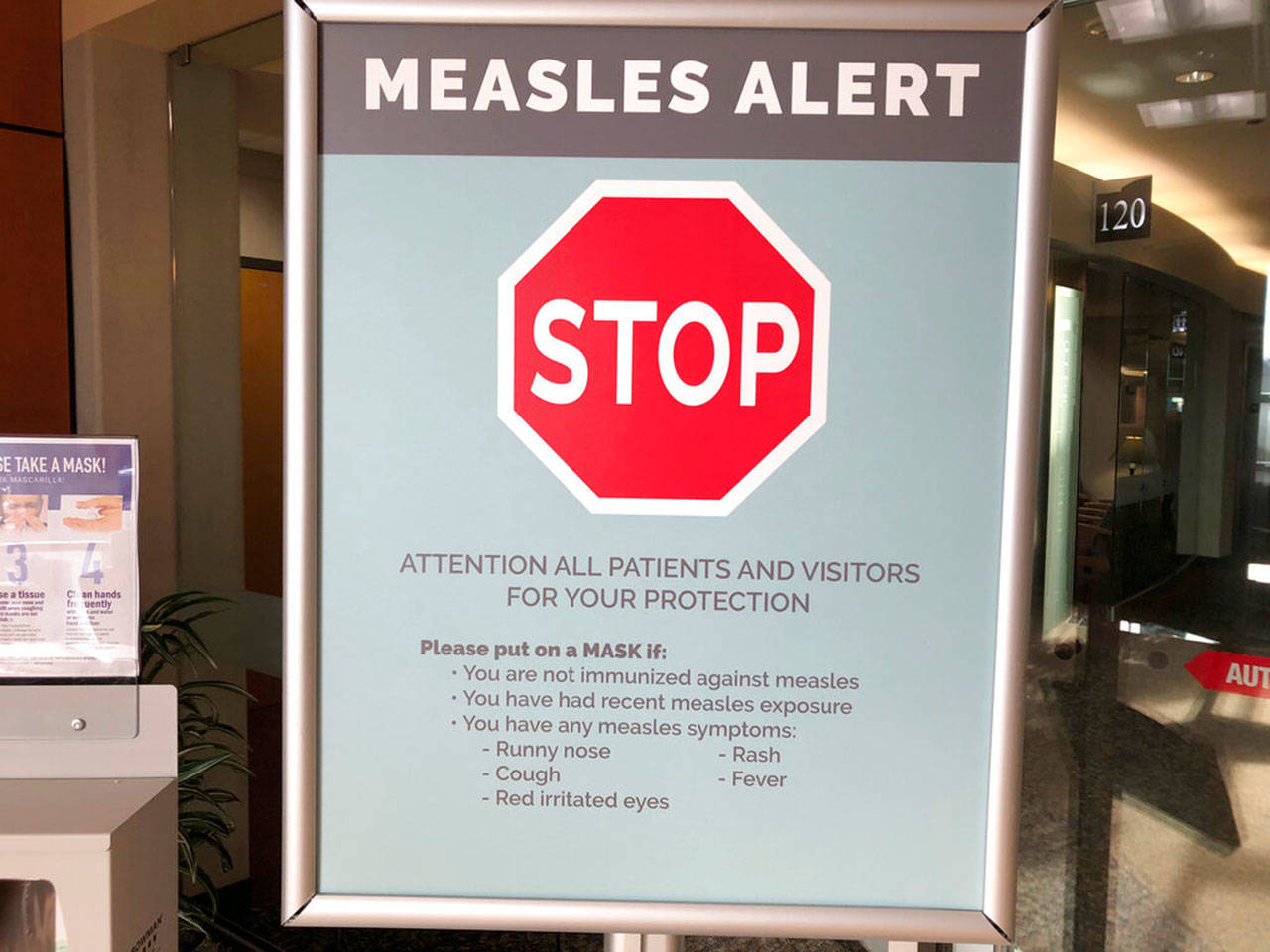By The Herald Editorial Board
We’ll make this quick, like a well-administered shot: Washington state should no longer allow parents a personal or philosophical exemption for the required childhood vaccination for measles, mumps and rubella.
There, and you don’t even need a bandage.
A bill in the state House — HB 1638 — would remove that exemption, but only for the MMR vaccine. The legislation, which gets its first hearing at 8 a.m. Friday before the Health Care and Wellness Committee in Olympia, was filed in response to a public health emergency in Clark County, an outbreak of measles among children.
Since the start of the year, Clark County Public Health has identified 49 confirmed cases of measles and another 11 suspected cases, most of those among children younger than 11. In 42 of the confirmed cases, the patients had not been immunized. Immunization status is unverified in six cases. In only one instance did a person who had been immunized contract measles in the latest outbreak.
Children younger than 5 and adults older then 20 are more likely to suffer complications from measles, according to the Centers for Disease Control and Prevention. Complications can range from the simple, such as ear infections and diarrhea, to more serious, including pneumonia and swelling of the brain. For every 1,000 children who get measles, the CDC reports, one or two children will be left with brain damage or will die.
All states allow for medical exemptions from vaccines and almost all allow exemptions for religious reasons. But Washington state, Oregon and 15 other states allow parents to exempt children from vaccinations for loosely stated personal or philosophical reasons. In Washington state, parents must present a record of vaccination or a certificate of exemption to enroll children in public schools.
Among the sponsors of the legislation is state Rep. Monica Stonier, D-Vancouver, who said she could respect matters of personal choice, to a point.
“Personal rights are important as long as they don’t impose on the rights of others,” she told the The Columbian.
And the decision not to vaccinate a child can have dire consequences not only for that child, but for other children and the community.
Clark County, reports The New York Times, has one of the lowest vaccination rates in the state. Only about 78 percent of students in kindergarten through 12th grade are vaccinated. To ensure immunity within communities — sometimes called “herd immunity” — a 93 percent vaccination rate is necessary to prevent a measles outbreak.
The legislation is narrowly focused, keeping both the medical and religious exemptions, as well as keeping the personal exemption for other vaccines, including hepatitis B; polio; diphtheria, tetanus and pertussis (DTaP); and chickenpox.
In an emergency situation that narrow focus is understandable, but removal of the personal exemption for all vaccines should be taken up later in the Legislature.
The justification for personal exemptions to vaccination are not valid and have in recent years relied on fraud, misinformation and a stubborn reliance on unreliable sources found in the echo chamber of the internet.
We are now almost a decade along from the remarkable decision by the respected medical journal, The Lancet, to retract — after 12 years — a 1998 paper that falsely tied vaccines to autism. The Lancet, in 2010, announced that several elements of the paper were “incorrect, contrary to the findings of an earlier investigation.”
The authors of the study, among them Andrew Wakefield, it was later learned, had been funded by lawyers acting on behalf of parents who were involved in lawsuits against vaccine manufacturers. Britain’s General Medical Council determined that Wakefield had acted unethically and shown “callous disregard” for children in his study who had been selected specifically for the study’s intended conclusions.
The “study” was repudiated, the article retracted and Wakefield was stripped of his right to practice medicine.
And The Lancet has been left with a scar that will be visible for decades, because Wakefield’s lie was allowed 12 years of legitimacy it didn’t deserve and continues to lurk like a virus on the internet.
There should be no doubt in the minds of parents: Vaccines do not cause autism. Vaccine ingredients do not cause autism. There is no link between any vaccine and autism spectrum disorder. These are the conclusions from nine studies funded or conducted by the CDC since 2003.
There is no reason for a personal or philosophical exemption from vaccines, least of all for the vaccine for measles, mumps and rubella.
The Legislature should end that exemption.
Talk to us
> Give us your news tips.
> Send us a letter to the editor.
> More Herald contact information.

























